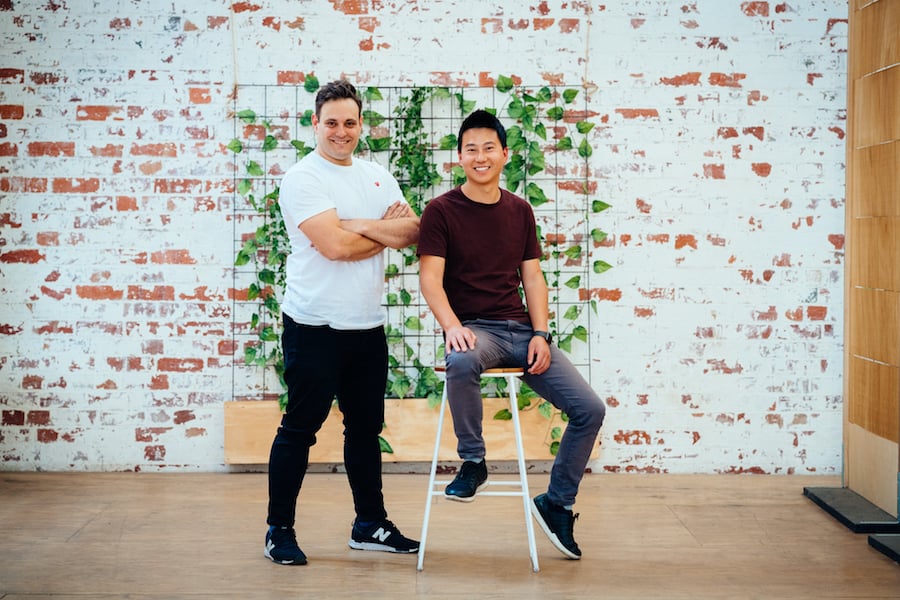While the number of tools available has made selling online easier than ever, running a successful ecommerce venture is harder than it looks – particularly if you’re designing and manufacturing your own product.
Despite knowing about all the work involved, Athan Didaskalou, founder of coffee subscription business Three Thousand Thieves, and Richard Li, cofounder of online furniture retailer Brosa, decided to take on a new challenge and team up to develop a new venture, July.
Launched last month, July wants to sell quality luggage cheaper than it would be in stores by selling direct-to-consumers – essentially, it’s like Australia’s answer to US offering Away, which in June raised US$50 million in Series C funding.
July’s first product is a carry on suitcase featuring an ejectable battery pack, selling for $295 with free shipping around Australia. Along with a lifetime warranty, the startup is also offering customers 100 day free returns.
The idea came to Didaskalou when he was shopping around for a new carry on suitcase to use while travelling interstate for work. Like many of us, he was stuck with just a few options: the retailers found in airports, or department stores.
“After going to David Jones and finding the luggage section in a dark corner upstairs, with no staff around or additional information about the bags, I left,” he said.
This experience led him to get in touch with Li, who he said is known for being “an amazing product sourcer across the world” with “a keen eye for unique opportunities”, and they soon realised there was a gap in the market.
“The fundamental nature of luggage has gone unchanged since the 1970s. Legacy brands play a role in a heavily commoditised market. Today, the old way of buying luggage is finding the cheapest thing out there and throwing it away when it breaks mid-journey. We wanted to design something that suited today’s travel needs better,” Didaskalou said.
“Applying the direct-to-consumer value proposition to the world of luggage means July avoids all the traditional overheads and retailer markups of the competitors and delivers the best product at a significantly lower price.”
Beyond the direct-to-consumer proposition, key to the July offering is, of course, the luggage itself.
With the battery one of its core features, Didaskalou said the startup faced a challenge in finding a way to create a casing for it within the handle.
“We needed to design the entire process and ensure the factory could retool in a way to make it and make it strong, all while including the battery factory in the same conversation so they could be involved too,” he explained.
“The more we spoke with the factory and their suppliers, the more we realised that the majority of the industry was ‘off the shelf’. To do what we needed to do we needed to retool the factory on almost every component so we could create the right shape and dynamic we needed for our unbreakable claim.”
The end result on the battery front, Didaskalou said, is a battery compartment that is TSA approved, with the intellectual property behind its design belonging solely to the startup.
The design and manufacturing process, of course, didn’t come cheap; the cofounders raised $300,000 in seed funding from a former Chinese manufacturing professional now living in Melbourne to fund the startup’s work in retooling suppliers in China and purchase initial stock.
They hope this link with their investor will also help the brand move into China; the cofounders saw on their trips to China that there is a growing market of Chinese goods made for the local market, of equal or better quality than what is being exported out, and believe there is a strong opportunity for July to tap into this.
First, however, must be Australia. According to Didaskalou, the startup sold over 100 cases within a few days of its launch last month, with its first orders to be shipped early next year.
It’s aiming the luggage at “creative professionals and creative travellers”, Didaskalou said, or “people who love new cultural experiences and are motivated by moments made”.
“We asked these people what they wanted in a case and we made it. A more progressive colour range, a focus on design and indestructibility, and simple features like the ability to charge your laptop on the go, even an included laundry bag that doesn’t make the rest of the case smell,” he said.
The focus on what customers want, Didaskalou said, came from both his and Li’s experiences with their other businesses, where they learned to focus on the entire customer experience, not just the sale.
“People see experiences in totality: whether you’re on their Instagram or on the website or talking to the delivery driver; whatever your experience in one area is, that carries across the entire spectrum,” he said.
“This means you have to deliver an amazing experience across multiple channels for everyone. The only way to do this well is to own that experience, hence why direct-to-consumer brands are doing so well with customers: they get it, they own it, they craft it.”
With its competition significant, the startup hopes to raise a Series A funding round next year to help expand its product range.
Image: Athan Didaskalou and Richard Li. Source: Supplied.




















Trending
Daily startup news and insights, delivered to your inbox.